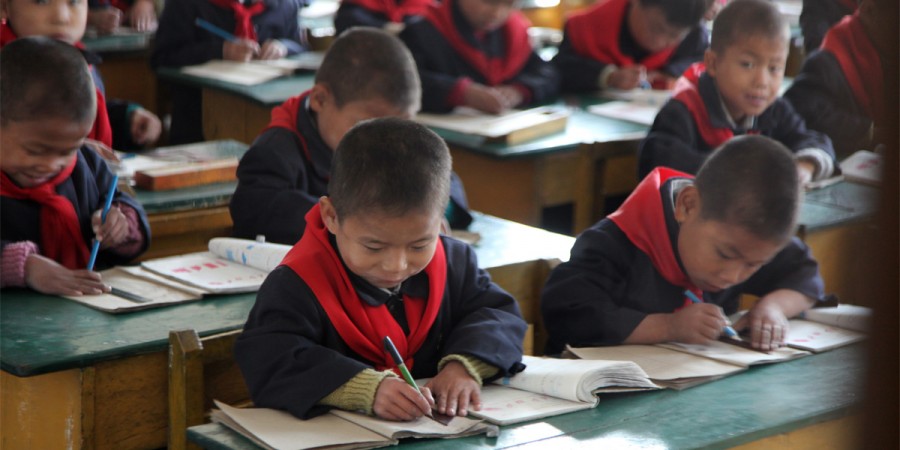Over the past years I have been to a number of refugee camps and communities where people experience humanitarian conditions beyond imagination. I have witnessed the human suffering caused by the ebola outbreak in West Africa, the earthquake in Nepal, the civil war in South Sudan and, not least, the horrific atrocities in Syria.
Whatever the challenging circumstances people lived under, one concern was shared by the children and parents I met: the need for a functioning school in the neighbourhood. Education was just as essential as safety, health, food and shelter.
However, 75 million school age children and youth in conflict and crises areas are in urgent need of support to get the schooling they are entitled to. I am extremely concerned that some Governments and the international community does not do more to ensure their fundamental right to education.
Less than 2 per cent of global humanitarian aid goes to education. But it is not acceptable to let children in desperate circumstances wait for education. Knowing that crises last for an average of 17 years, humanitarian crises should not be considered only short-term challenges, but be addressed with a longer-term perspective.
Norway is pleased to participate in the launch of the “Education Cannot Wait – fund for education in emergencies” at The World Humanitarian Summit. The process of establishing a common platform and fund was given a boost last summer at the Oslo Summit on Education for Development. Istanbul is another important step. A range of organisations, donors and partner countries working on education in emergencies and protracted crises have come on board. Now the real work of putting in place the resources that are required to make a long lasting difference on the ground, can really start. The initiative will need all the support it can get.
First and foremost, governments and decision-makers responsible for ongoing conflicts, human right violations and widespread corruption must be held to account. Donor countries must coordinate and strengthen our support to the many governments that take responsibility, but are stretched to capacity in trying to provide a functioning education system. Together, we need to both mobilize more money and spend existing resources more efficiently through joint approaches that bridges humanitarian aid and development cooperation.
The platform and fund launched at World Humanitarian Summit will be designed to address many of these challenges. It is set up to inspire political commitment, mobilize additional resources, strengthen capacity, improve accountability and ensure joint responses.
Norway will also continue to mobilise support for The Safe Schools initiative. In many countries, armed conflict continues to destroy not just school infrastructure but the hopes and ambitions of a whole generation of children. Educational facilities are regularly used for military purposes by governmental armed forces and security forces, and by armed non-state groups, putting them at risk of attacks and jeopardizing access to education in conflict situations. Further, schools and universities have increasingly become the targets of violent attacks for political, military, ideological or other reasons. This is unacceptable. Norway therefore, together with Argentina, took the initiative to the Safe Schools Declaration. More than fifty States have now endorsed this political declaration. They have committed themselves to work together to strengthen the protection of educational facilities, their students and staff.
The Oslo Summit on Education for Development established an International Commission on Financing Global Education Opportunity, chaired by the UN Special Envoy for Global Education Gordon Brown. Its main task is to develop a renewed and compelling investment case and financing pathway for achieving universal access to quality education. The Commission will identify innovative sources of funding where they are needed the most – including for education in emergencies and protracted crises.
When the Commission hands over its report to the UN Secretary General in September, it will be one year since world leaders took on the Sustainable Development Goals set by the United Nations. Previously, the Millennium Development Goals had ¬contributed to lifting more than one billion people out of extreme poverty. Now, we have a new international commitment to eradicate extreme poverty by 2030 and ensure that every child can exercise their right to go to school, including those with disabilities and those in areas hard to reach.
It is essential to get children back into school for so many reasons – youngsters who are not in school are at a higher risk of exploitation, girls are more at risk of child marriage or sex slavery, boys of becoming child soldiers. The statistics show that the longer a child stays out of education, the less likely she or he is to return. In all corners of the world, schools carry the promise of opportunity and aspiration for the future. Everywhere education is a prerequisite for development. In countries affected by conflict and crisis quality education creates the foundation for reconciliation and rebuilding of societies.
Which is why the Norwegian government is in the process of doubling our support for education, and why we consider education to be at the core in both humanitarian aid and development cooperation.
The result of business as usual will be an entire generation denied their right to education. This would be a human right violation with far reaching consequences. We cannot let this happen on our watch.


Comments